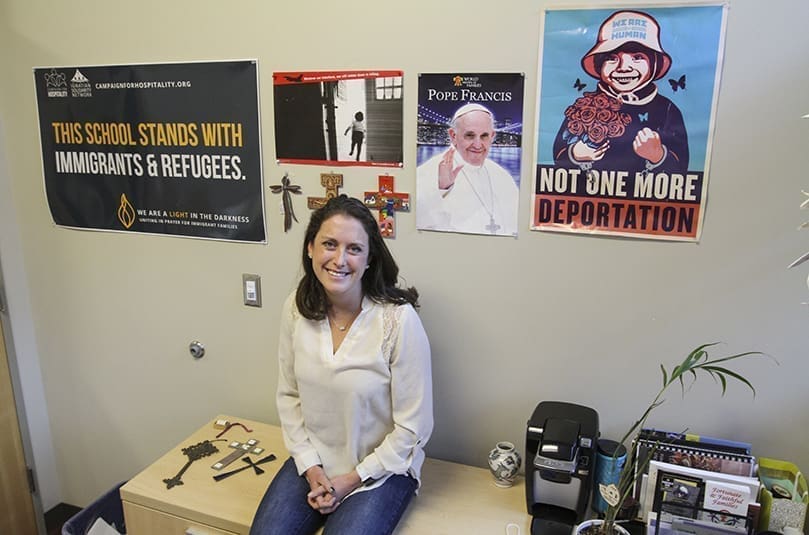 Photo By Michael Alexander
Photo By Michael AlexanderAtlanta
Marist campus minister reflects on radical discipleship
By ANDREW NELSON, Staff Writer | Published January 22, 2021
ATLANTA—Bernadette Naro grew up expecting strangers as the guests of honor at the family’s Thanksgiving dinners, spending Saturdays at a city park giving food away or keeping a vigil outside of death row before an execution.
Life in her family home, a Catholic Worker House in Garner, North Carolina, meant Mass celebrated in the living room and bedrooms set aside for women and their children in need of a place to stay.
“I grew up with my parents often reminding me of Matthew 25 as guiding Scripture for our lives,” said Naro. “They took the corporal works of mercy very seriously.”
Naro was 17 and a high school junior at her first arrest. She joined her father and others trespassing at a North Carolina airport where activists believed an aviation company flew people accused of terrorism to CIA secret holding sites. She has since been taken into custody a handful of times protesting against war and violence.
In October, Naro, 32, spoke in the Brunswick federal courthouse as a character witness after her father’s latest conviction.
Patrick O’Neil, 64, is one of the Kings Bay Plowshare 7, a group of Catholic peace activists who on April 4, 2018, cut through a security fence to sneak onto the Naval Submarine Base Kings Bay, home of Trident submarines, which carry nuclear warheads. The group poured human blood on an official seal, strung crime tape, hammered a nuclear missile display and hung a banner quoting Rev. Dr. Martin Luther King Jr. The day they vandalized the military installation was the 50th anniversary of his assassination.
Police apprehended the group for breaking federal law and a jury found them guilty in October 2019.
The Catholic nuclear abolitionists aim to live out the biblical prophecy proclaimed by Isaiah to “beat swords into plowshares.”
The action was “the right thing to do” and drew attention to the peril of nuclear weapons that can destroy the earth, O’Neil said. “We went there to smash idols and to beat swords into plowshares,” he said, speaking from his North Carolina home, the Father Charles Mulholland Catholic Worker House. The New York City native was drawn to the mission in the aftermath of the Vietnam War and befriending a North Carolina priest dedicated to civil rights and peace efforts.
O’Neil received a sentence of 14 months in a minimum-security federal prison. He reported to prison in early January.
A jail cell is not unfamiliar to him. He served 17 months behind bars at the United States Penitentiary, Atlanta, in the mid-1980s as part of a sentence of two years and two months for a protest against a defense contractor.
While in prison, O’Neil said he will continue to be committed to the faith, especially acts of mercy. Raising the dignity of prisoners is key, he said, recalling how during one stint he spent commissary money to pay for a party for his cellblock serving tuna salad, crackers, powered fruit punch, led them in a rousing singing of “Freedom” by Richie Havens and shared a reading from Isaiah.
The time in prison is to “take your gifts and use them to better the lives of others,” he said.
The biggest burden is carried by his wife, Mary Rider, who takes up running the house and its ministries by herself, and his children, he said.
Rider is a home health care social worker.
Naro told the federal judge how her father taught her family of eight brothers and sisters in the middle of squabbles to see the other as the body of Christ.
“(He) taught me to behold God’s creation with awe and delight, and of the role we have to fiercely defend anything that threatens to destroy God’s creation,” she said in the courtroom.
Naro, her husband, Jeff, and young daughter settled in Atlanta’s West End, the same neighborhood where she lived with her Jesuit Volunteer Corps community in 2010 when she worked with families at Catholic Charities Atlanta.
She earned a master’s degree in divinity at Emory University’s Candler School of Theology and has worked in three Catholic high schools in Atlanta. Before the pandemic, the family attended the Shrine of Immaculate Conception.
Naro said she would never talk her father out of an action he is committed to seeing through, though it risks separating him from her toddler child. He sees things through a broader perspective and risks his freedom to make his granddaughter’s world better where there is no risk of nuclear war, she said.
As a campus minister at Marist School, Naro said the focus of her programs is helping students grow into leaders and ensuring campus culture is one of “radical hospitality … where everyone feels like they belong, that they’re loved and they’re valued and they’re seen.”
Seeing the passion of her mother and father made her question her way of living the faith.
“You know what it boils down to is, am I living my life in service of God and in service of others? I think a younger, more fiery version of myself, had a kind of more prescriptive answer. But that is a continual question: is my life serving God? Is my life serving others or is it self serving?”
“What my parents did was demonstrate to me the importance of living my faith out and responding to God’s call to build God’s kingdom and making that the central question in my life.”
